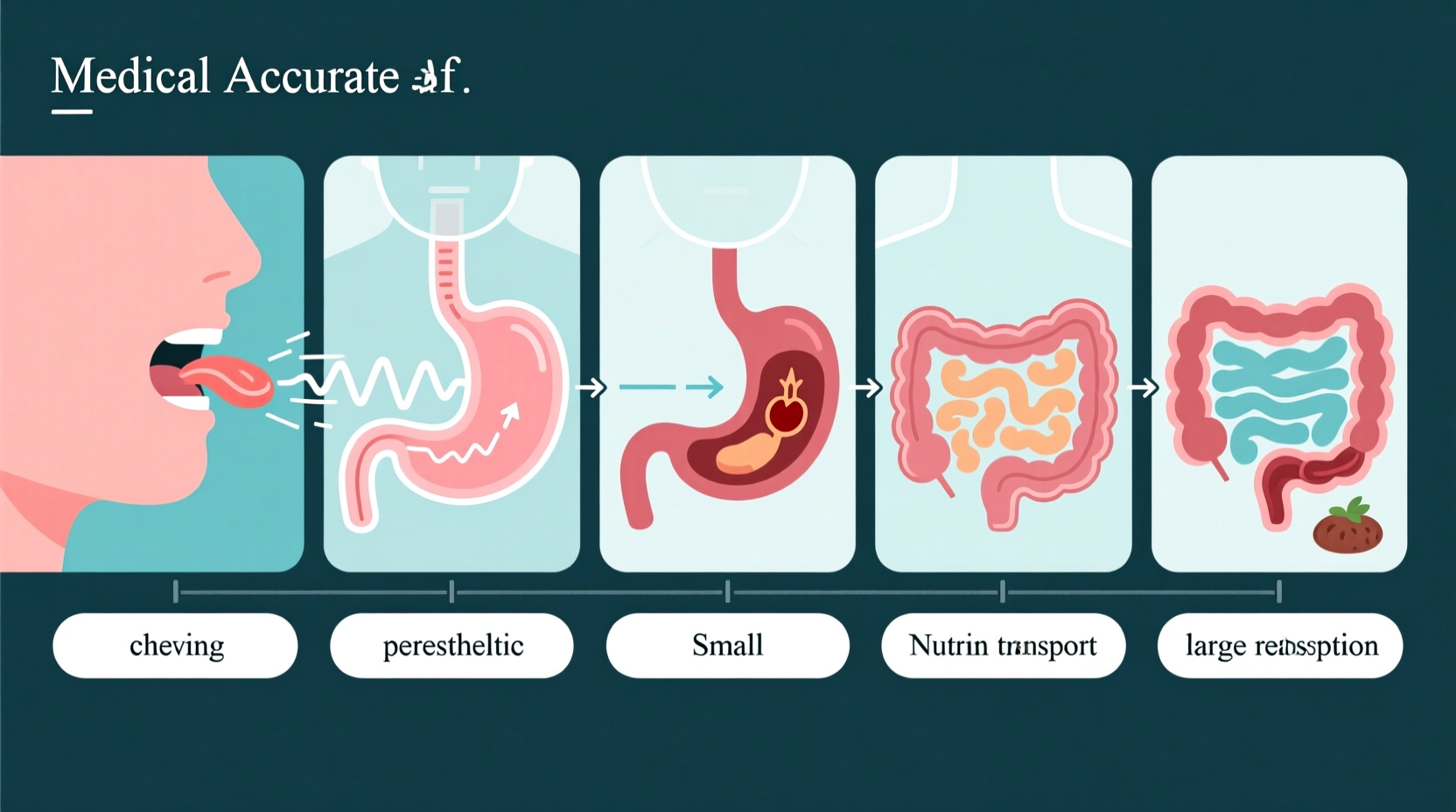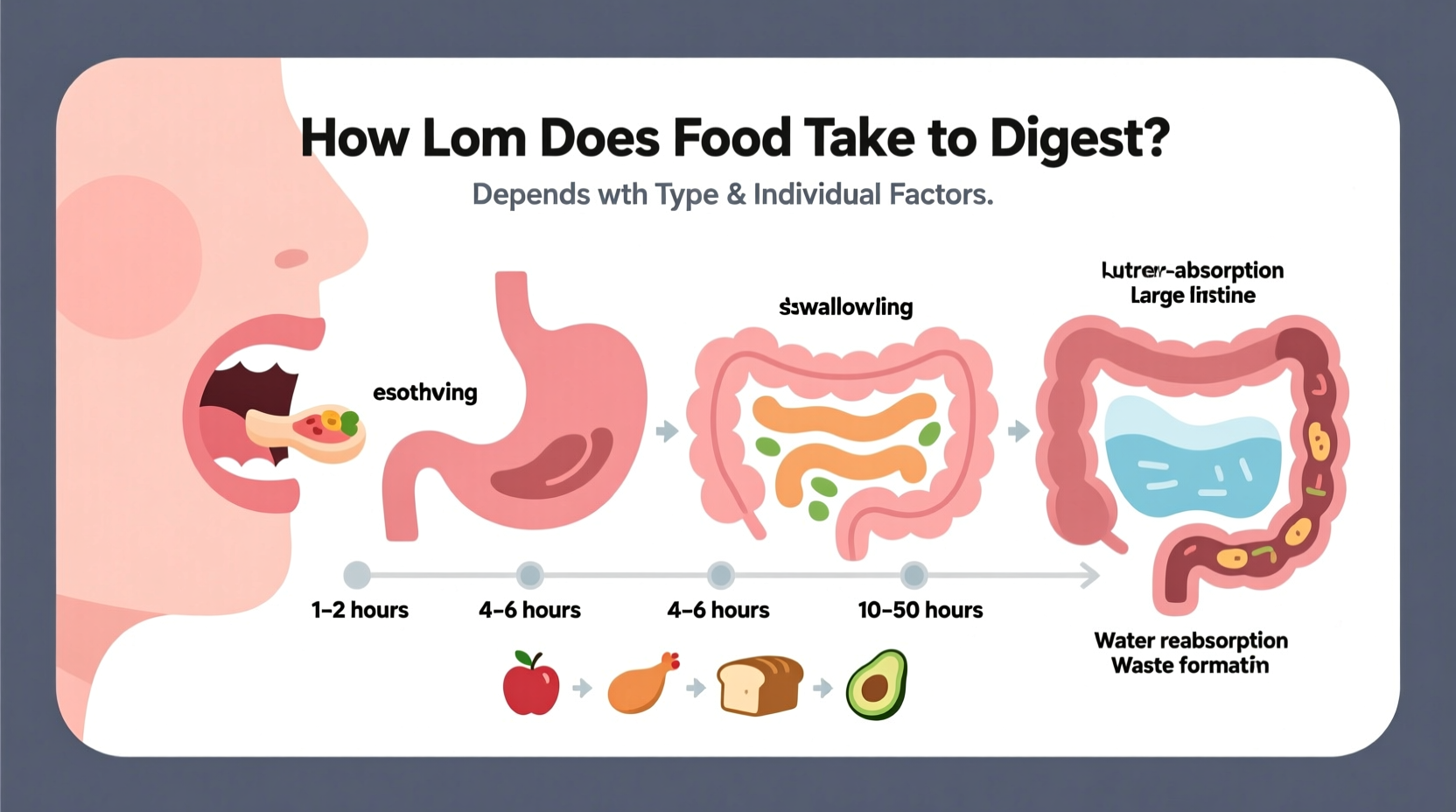Understanding digestion timelines helps you recognize normal bodily functions and identify potential digestive issues. This science-backed guide explains exactly how long different foods take to digest, factors affecting your digestive speed, and when to consult a healthcare professional.
What Happens During Digestion: The Complete Journey
Digestion isn't a single event but a complex journey through multiple organs. When you eat, food begins its path through your digestive system, transforming from solid matter into absorbable nutrients. This process involves mechanical breakdown, chemical processing, and nutrient absorption across different digestive stages.
Contrary to popular belief, digestion doesn't end when food leaves your stomach. The entire process spans multiple days as your body extracts every possible nutrient before eliminating waste. Your digestive system works continuously, even while you sleep, processing approximately 2-3 liters of food and liquids daily.
Digestion Timeframes by Food Type
Not all foods digest at the same rate. Complex factors like fiber content, fat composition, and protein structure significantly impact how quickly your body processes different foods. Understanding these differences helps explain why some meals leave you feeling full longer while others seem to pass through quickly.
| Food Type | Stomach Emptying Time | Total Digestion Time | Key Factors |
|---|---|---|---|
| Water | Immediate | ~1 hour | Hydration status, temperature |
| Fruit (watermelon, oranges) | 20-30 minutes | 20-40 minutes | Simple sugars, high water content |
| Vegetables (leafy greens) | 30-40 minutes | 40-60 minutes | Fiber content, cooking method |
| Carbohydrates (bread, rice) | 1-2 hours | 2-3 hours | Refined vs. whole grain |
| Proteins (chicken, fish) | 2-3 hours | 3-4 hours | Protein complexity, fat content |
| Fats (avocado, nuts) | 3-4 hours | 4-6 hours | Type of fat, portion size |
| High-fiber meals (beans, whole grains) | 2-3 hours | 18-24 hours | Fiber composition, hydration |
According to the National Institute of Diabetes and Digestive and Kidney Diseases, the complete digestive process typically spans 24-72 hours for most adults. This timeframe represents the journey from ingestion to elimination, with significant variation based on individual factors and meal composition.

The Digestive Timeline: What Happens Hour by Hour
Your digestive system processes food through a carefully orchestrated sequence. Understanding this timeline helps explain why certain foods affect your energy levels and satiety differently.
0-15 Minutes: The Mouth and Esophagus
Digestion begins the moment food enters your mouth. Saliva contains amylase enzymes that start breaking down carbohydrates. Chewing thoroughly (20-30 times per bite) creates smaller particles that digest more efficiently. Food then travels down the esophagus in about 2-3 seconds via peristaltic waves.
15 Minutes-4 Hours: The Stomach Phase
In the stomach, food mixes with hydrochloric acid and digestive enzymes. Proteins begin breaking down into amino acids, while fats separate from other components. The stomach's muscular contractions churn food into chyme, a semi-liquid mixture that passes gradually into the small intestine. High-protein and high-fat meals remain in the stomach longest.
2-6 Hours: Small Intestine Processing
Nutrient absorption primarily occurs here. Bile from the liver and enzymes from the pancreas further break down food. Carbohydrates become simple sugars, proteins become amino acids, and fats become fatty acids. These nutrients pass through the intestinal wall into your bloodstream. Most nutrient absorption completes within 6 hours.
10-59 Hours: Large Intestine Transit
What remains after small intestine processing moves to the large intestine. Here, water and electrolytes are absorbed, and beneficial bacteria ferment remaining fiber. This stage determines stool consistency and frequency. The Mayo Clinic notes that transit through the large intestine typically takes 10-59 hours, with significant individual variation.
Factors That Speed Up or Slow Down Digestion
Several elements influence your personal digestion timeline. Recognizing these factors helps you understand your body's unique digestive patterns and make informed dietary choices.
Dietary Factors
- Fiber content: High-fiber foods generally move through your system faster but require more time for bacterial fermentation in the large intestine
- Food combinations: Fats slow gastric emptying, while simple carbohydrates move more quickly
- Hydration: Adequate water intake supports efficient movement through the digestive tract
- Meal size: Larger meals take longer to process than smaller ones
Individual Health Factors
- Age: Digestive efficiency often decreases with age due to reduced enzyme production
- Physical activity: Regular movement stimulates intestinal contractions
- Stress levels: High stress can significantly slow digestion through nervous system effects
- Underlying conditions: IBS, IBD, diabetes, and thyroid disorders affect digestion speed
When Digestion Times Warrant Medical Attention
While digestion times vary widely, certain patterns may indicate underlying issues. The National Institute of Diabetes and Digestive and Kidney Diseases identifies these red flags:
- Consistently less than 10 hours for complete digestion (possible malabsorption)
- Regularly more than 72 hours between bowel movements (chronic constipation)
- Sudden, unexplained changes in digestion patterns lasting more than two weeks
- Digestion accompanied by severe pain, blood in stool, or unexplained weight loss
Temporary variations are normal, especially after dietary changes, travel, or illness. However, persistent abnormalities deserve medical evaluation to rule out conditions like gastroparesis, irritable bowel syndrome, or inflammatory bowel disease.
Supporting Healthy Digestion: Practical Tips
You can optimize your digestive health with these evidence-based strategies that work with your body's natural processes:
Mindful Eating Practices
- Chew thoroughly (20-30 times per bite) to reduce stomach workload
- Avoid drinking large amounts of liquid during meals to maintain stomach acid concentration
- Practice portion control to prevent overwhelming your digestive system
- Allow 3-4 hours between meals for complete gastric emptying
Nutritional Strategies
- Incorporate probiotic-rich foods like yogurt, kefir, and fermented vegetables
- Include diverse fiber sources from fruits, vegetables, and whole grains
- Stay consistently hydrated throughout the day (not just with meals)
- Consider food combining principles that support natural digestive enzyme activity
Lifestyle Adjustments
- Engage in light physical activity after meals (10-15 minute walk)
- Manage stress through meditation, deep breathing, or yoga
- Maintain regular sleep patterns to support circadian digestive rhythms
- Avoid late-night eating to allow complete digestion before sleep
Understanding Your Unique Digestive Pattern
Everyone's digestive system operates on a slightly different timeline. Factors like genetics, gut microbiome composition, and lifelong dietary habits create unique digestive profiles. Tracking your digestion patterns for 1-2 weeks can reveal your personal baseline.
Consider keeping a simple food and symptom journal noting:
- What you eat and when
- Bowel movement timing and consistency
- Any digestive discomfort or symptoms
- Stress levels and sleep quality
This personalized approach helps distinguish normal variations from potential concerns, empowering you to make informed decisions about your digestive health without unnecessary worry.
Frequently Asked Questions
How long does it take for food to move through the stomach?
Most foods spend 2-5 hours in the stomach, with liquids moving through fastest and high-fat, high-protein meals taking longest. The stomach empties about 1-4 ounces per minute into the small intestine, depending on meal composition.
Why do some foods digest faster than others?
Foods digest at different rates due to their chemical composition. Simple carbohydrates break down quickly, while proteins and fats require more complex processing. Fiber content also affects speed—soluble fiber slows digestion while insoluble fiber speeds waste elimination.
Can I speed up my digestion naturally?
Yes, through several evidence-based methods: staying hydrated, eating adequate fiber, engaging in regular physical activity, managing stress, and chewing food thoroughly. However, extremely rapid digestion may indicate malabsorption issues that require medical evaluation.
How long after eating should I expect a bowel movement?
The gastrocolic reflex typically triggers bowel movements 30-60 minutes after eating, but complete digestion takes 24-72 hours. The meal you're responding to now was likely eaten 1-3 days ago, as food takes time to travel through the entire digestive tract.
Is it normal to digest food in less than 24 hours?
Yes, some foods like watermelon or broth-based soups can move through your system in under 24 hours, especially if you have a high metabolism or active lifestyle. However, consistently rapid digestion of all foods may indicate issues like hyperthyroidism or malabsorption that warrant medical attention.
By understanding the science behind digestion timelines, you can make informed choices that support your digestive health while recognizing when professional guidance might be beneficial. Remember that individual variation is normal—what matters most is consistency with your personal pattern and absence of concerning symptoms.
Author: Antonio Rodriguez











 浙公网安备
33010002000092号
浙公网安备
33010002000092号 浙B2-20120091-4
浙B2-20120091-4